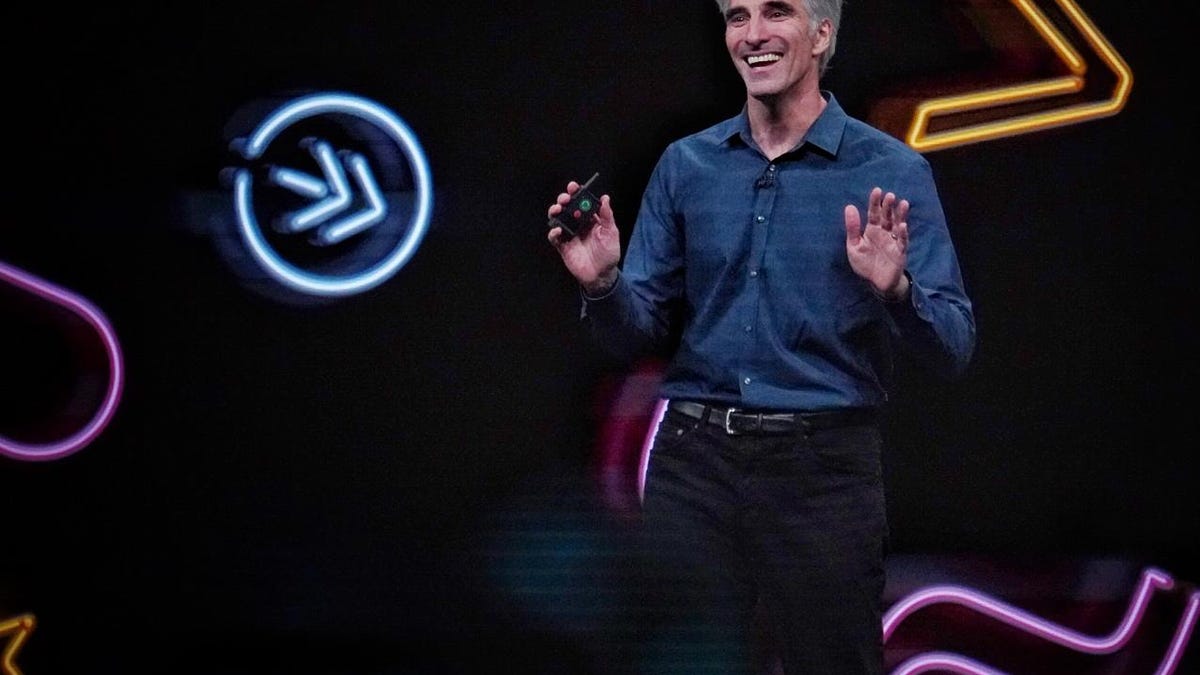Apple software head Federighi argues against sideloading iPhone apps in rare public speech
Apple's top software engineering executive gives a presentation at the Web Summit in Lisbon, Portugal.

Craig Federighi, Apple's head of software engineering.
Apple's head of software engineering, Craig Federighi, took to a stage in Lisbon, Portugal, to defend the way his company manages its popular App Store, and its tight control over the iPhone and iPad . In a public speech, which is a rare moment for any Apple executive outside one of the company's presentations, Federighi reiterated the company's arguments that sideloading could hurt phone security.
"There's no such thing as a perfect security system," he told the crowd gathered for the annual Web Summit on Wednesday. But, he said, things would be much worse under a provision being considered for the EU's Digital Markets Act law that would force Apple to allow people to install apps from places other than its App Store.
"The constantly improving protections we've built have managed to stay one step ahead of the bad guys," he added. "Long story short, iPhone's security approach worked."
Federighi's comments mark the latest in a series of efforts by Apple to weigh in on pressing political discussions around the tech industry . And he's doing it at a time when lawmakers and regulators around the world are increasingly turning their attention to tech giants, including Apple, considering potential new rules to curb their power. When it comes to Apple in particular, that means turning attention to the App Store, the only sanctioned way to install apps on the company's most successful device, the iPhone.
Read more: Apple again makes its case against sideloading apps on iPhones in new security research report
Over the past year in particular, Apple's expanded beyond making public policy arguments at its product rollout events and in ads. In the past few months, the company has published public statements on its website aimed at politicians and interest groups, for example. It's also taken a swipe at a series of antitrust bills being considered before the US Congress that would, like the EU's Digital Markets Act, potentially weaken Apple's control over its devices and App Store. And in June, Apple CEO Tim Cook criticized the act in a videoconferenced speech to a tech event in France.
Apple has also faced legal challenges to its App Store. In the last year, Fortnite maker Epic Games has argued that Apple exerts too much control over our devices. Ultimately, Epic argued in its legal filings, Apple has become a "behemoth seeking to control markets, block competition and stifle innovation." Epic largely lost its legal case against Apple, though it is appealing.
While defending Apple's App Store to the Web Summit crowd, Federighi highlighted scamming and malware efforts on other platforms. He noted that Apple's iOS software that powers iPhones has a fraction of the reported malware attacks other devices have.
In one instance that Federighi highlighted, hackers attempted to convince people to install malware on their phones powered by Google 's Android through a supposed COVID-19 app.
"This happens all the time," he said. "Cybercriminals are clever."
Read more: Apple, defending its App Store, takes first swipe at new tech antitrust bills on Capitol Hill
Federighi also rebutted arguments that people should have the choice to decide what to put on their devices. "The fact is, one compromised device, including a mobile phone, can pose a threat to an entire network," he said. "Malware from sideloaded apps can jeopardize government systems, enterprise networks, public utilities, the list goes on. So even if you never sideload, your iPhone is less safe in a world where Apple is forced to allow it."



